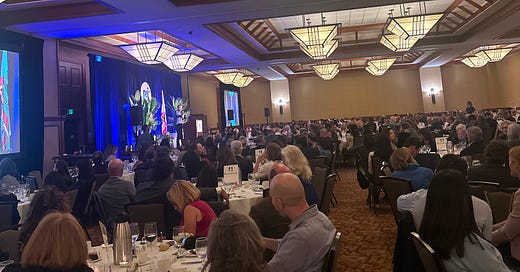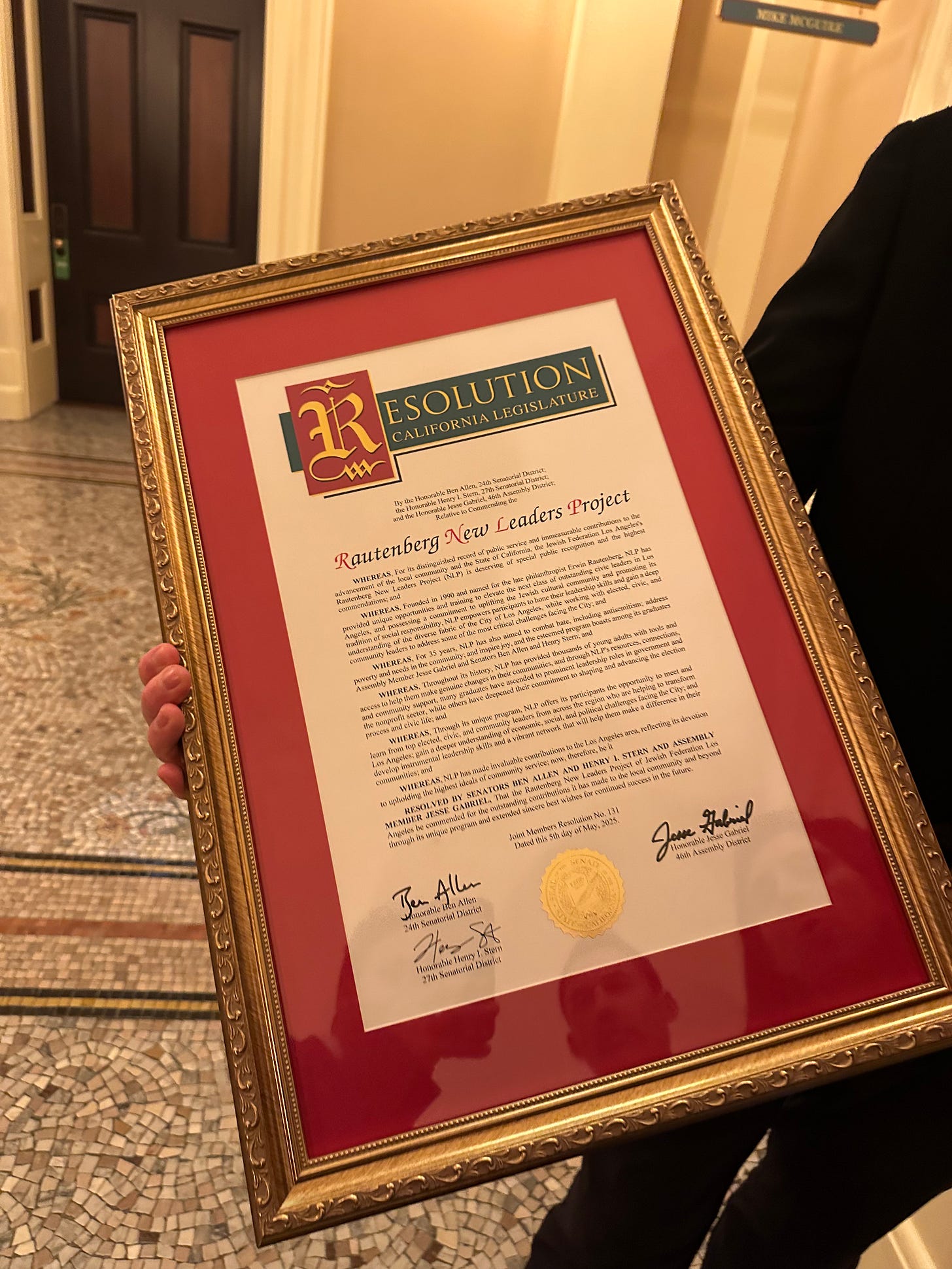What Happens When You Actually Show Up: Lessons from JPAC
You go to make change. You leave changed.
At some point a speaker announced that we’d filled the largest conference hall in the city. Over 600 Jews and allies, gathered in Sacramento for JPAC Advocacy Day, ready to meet with state representatives and speak up for the causes we care about. We weren’t just a delegation. We were a movement.
At first, the whole thing felt like an adult field trip. There were name tags, a long line at check-in, and volunteers with laminated signs. We were apart of the JFED LA’s delegation attending as the 2025 cohort for the Rautenberg New Leaders Project (NLP) which earned us a special Capitol Tour, included sitting in on the State Senate floor and a commemorative plaque of our visit, I still await my copy. It was all very surreal.
Later, outside Capitol building, I finally took a breath. Grabbed a drink with friends, let my guard down and realized, I felt at home. I was a part of something bigger than me and it was IRL (In Real Life). This wasn’t a protest march; to voice dissatisfaction. It was a coordinated policy negotiation. We were all drafted into this mission. None of us were experts in the legislative fine print, but we were experts in our own lived experience.
You don’t have to start the revolution to help lead. Sometimes you show up and play your part.

The experience was… a lot. Energizing. Emotional. But what stayed with me most was the feeling of belonging. It was easier to talk to strangers here than in most places. We shared values, concerns, and grievances. And while we didn’t agree on everything, we were united in at least one quiet, unspoken, truth: the total lack of a decent deli was deeply felt. Palpable I would say. But more overtly, we were united by a shared purpose: advocating for a slate of legislation that reflected both our community’s needs and our broader moral commitments. We lobbied in support of efforts to ensure accurate and unbiased ethnic studies in California schools and to strengthen Holocaust and genocide education through dedicated grant programs.
We pushed for expanded food benefits for low-income students and summer meal access for both children and their caregivers. And we stood up for our aging Holocaust survivors. Fighting to secure trauma-informed at-home care that allows them to age with dignity. These weren’t abstract policy goals. They were urgent, personal, and deeply aligned with our values.
California isn’t just the most populous state in the Union, it’s the fourth largest economy in the world. Policy that happens here, matters there. Lobbying, as part of a collective, that legislative body; that’s power.
It was my first time in the Capitol since fifth grade, back when the biggest issue was panning for “gold” not policy advocacy. But this time, we came with purpose. I met people who told me they felt scared. Threatened by the rising tide of antisemitism, all exhausted by the silence around it. And even though most weren’t policy professionals. They just decided to take time from their busy lives and do something. And that was enough.

The sheer logistics of it all the scheduling, the shuffling of 600+ people across the Capitol to meet with legislators, to share how these issues impact them personally, to leave a human impression was just staggering. And yet, that coordination, that boots-on-the-ground presence, was making more of a singular impact than any ad campaign because the audience was so niche. Empowered messengers with their real story, backed by the presence of the collective physical show of force. Power in numbers. Power in community. Power for all of us.
For many Millennials and Gen Z-ers, community has moved online. We text more than we call, and many of our closest friends live in threads with more memes and LOLs than new plans to get together. And while digital spaces absolutely matter (I’ve built a career in narrative messaging and political storytelling, after all), there’s still no substitute for showing up in person. Especially when the stakes are high.
And maybe that’s the not-so-quiet power of advocacy days with JPAC: you go thinking you’re there just to make change and you leave realizing you’ve been changed too. It’s not glamorous. It’s often awkward. Frequently tedious (lots of waiting for elevators). But it’s real. And it’s how we build something lasting.
I don’t think I’ve found all the right words yet. But I know this: I’ve found my place. And I believe others can find theirs too.
There are people out there already doing the work you care about. They’re organizing, advocating, showing up. You don’t have to carry it all alone, or build something from scratch, to be part of it. You can join. You just have to start looking.
Find the cause that moves you, or the community that welcomes you—best-case scenario, it’s both. Bring yourself. Support their plans, or offer your own. If you feel even a little less alone, that’s already enough.
That’s where the magic happens and the work begins.





